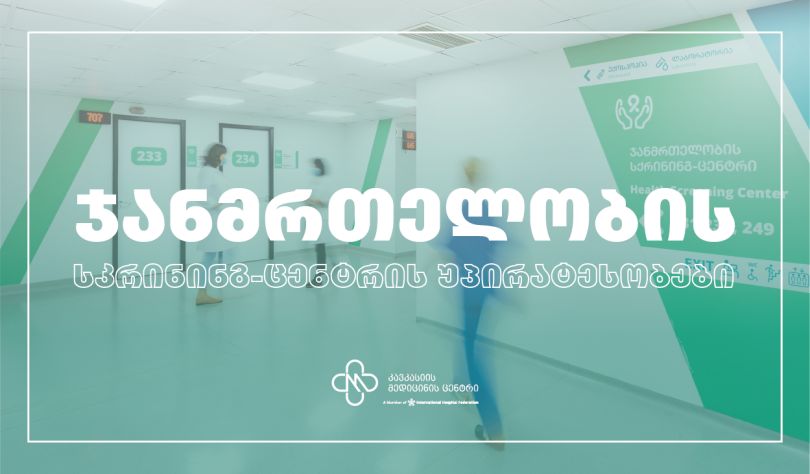


Blog
Colon cancer treatment abroad
27 January 2020

Colorectal cancer is one of the most common oncological diseases in the world. According to the World Health Organization, in 2018, 1.8 million people fell ill with colorectal cancer. In this article how dangerous this disease and how the treatment of colorectal cancer is carried out abroad. Will be discussed
When talking about bowel cancer, the term colorectal cancer is often used. Large intestine cancer, one of the colon departments responsible for food processing, also belongs to this group. The large intestine is located between the small intestine and rectum.
Cancer occurs when abnormal cells appear in the rectal mucosa. Cancer cells divide and begin to grow into neighboring structures. So, a tumor appears.
In the later stages, the patient's condition worsens. Tumor intoxication leads to weight loss, discoloration of the skin, a state of constant fatigue and weakness.
So, the neoplasm is low-grade and well-differentiated. A malignant tumor with a low degree of differentiation grows rapidly and metastasizes. Well-differentiated adenocarcinoma grows more slowly, the neoplasm affects other organs only during the late stages of development.
Depending on where the neoplasm grows, an exophytic form of cancer is distinguished, during which the tumor grows in the intestinal lumen and endophytic, during which the neoplasm grows into the intestine, and the last, mixed type.
Colonoscopy is the most informative way to diagnose colon cancer. This procedure is carried out using an endoscope - a tool with a camera. The examination allows the examination of the rectum and colon of the patient and taking a tissue sample if a suspicious area is found.
The collection of material for further laboratory research is called a biopsy. A biopsy is the only study according to which it is able to confirm or refuse the diagnosis of cancer.
After diagnosis, the doctor states the stage of the disease. The doctor must understand how deep the tumor has grown, whether any other organs and lymphatic system are affected. A number of examinations are carried out for this reason:
The Caucasus Medical Center offers diagnostic services for colorectal cancer and other oncological diseases. The hospital employs qualified doctors who have gained experience working abroad. Using the latest equipment, specialists will be able to carry out high-quality diagnostics, accurately diagnose and determine at what stage the disease is developing.
During the third stage, a course of radiotherapy is prescribed before the operation. This is necessary so that the tumor becomes smaller. The fourth stage treatment focuses on relieving symptoms and improving the patient's quality of life. as a rule, patients are prescribed a course of chemotherapy.
The Caucasus Medical Center specializes in the treatment of cancer. Various cancer treatment surgeries are carried out at the clinic, radiotherapy and chemotherapy are used to treat malignant neoplasms.
The Caucasus Medical Center conducts unique operations to remove various kinds of tumors, including the ones in the rectum. The surgeons of the center strive not only to improve the results of treatment but also to improve the quality of life of the patient.
The quality of the operation greatly depends on the result of the cure. Organ-preserving operations and laparoscopic operations are performed at the medical center. When conducting laparoscopic surgery on the patient’s abdominal cavity, only a few incisions are made. Such operations are called minimally invasive.
In cases where cancer treatment is ineffective, patients receive palliative care aimed at alleviating the symptoms of the disease. Palliative care includes not only chemotherapy drugs, but also, for example, surgical operations to form a stoma.
The Caucasus Medical Center is located in Tbilisi, the capital of Georgia, but the hospital receives not only local but also international patients. Medical tourism is one of the main divisions of the clinic. The treatment process for international residents is built on patient’s comfort. Medical staff takes care of all administrative matters.
The recovery period after chemoradiotherapy is approximately six months to a year. During this time, the stage may decrease in patients, in rare cases, the tumor disappears completely. If this does not happen, the damaged section of the rectum is surgically removed to the patient. The use of an integrated approach in many cases allows organ-preserving surgical treatment.
The Caucasus Medical Center successfully combines chemotherapy drugs and radiation therapy with surgical operations to remove the neoplasm. The hospital uses modern chemotherapy drugs and the latest high-technology equipment, which allows directing the rays at the tumor without damaging healthy cells.
During the first months after surgery, it is necessary to visit the doctor relatively often and inform him of any changes in the condition. If necessary, the doctor will prescribe a CT scan or MRI. One year after treatment, the frequency of doses can be reduced.
Doctors of the Caucasus Medical Center provide patients with care at all stages of treatment. Treated patients have the opportunity to get a doctor's consultation at any convenient time, including online. At discharge, the patient is given recommendations for further action.
The Caucasus Medical Center is the largest hospital of the Evex chain. The network includes 19 clinics located in different regions of Georgia. The hospital successfully collaborates with clinics around the world and the Ministry of Health of Georgia.
The hospital has an oncohematologic department. Patients undergoing treatment are referred to a hospital where they are cared for. The advantage of the center is the provision of quality medical care in the shortest possible time at affordable prices. All operations, including cancer surgery, are performed throughout 24 hours. Doctors try to minimize postoperative complications and carefully monitor the condition of patients both before and after the operation.
Becoming a patient at the clinic is very simple: you need to leave a request on the website. An employee will contact you to answer your questions and advise you on what to do next.
What is colorectal cancer?
Colorectal cancer is an oncological disease during which a tumor is found in the final section of the intestinal tube, called the rectum. The organ is located directly in front of the anus and is responsible for the accumulation and excretion of feces.When talking about bowel cancer, the term colorectal cancer is often used. Large intestine cancer, one of the colon departments responsible for food processing, also belongs to this group. The large intestine is located between the small intestine and rectum.
Cancer occurs when abnormal cells appear in the rectal mucosa. Cancer cells divide and begin to grow into neighboring structures. So, a tumor appears.
What is the cause of colon cancer?
Modern medicine cannot ascertain what is the reason for rectal cancer appearance. However, the examination of patients with cancer allows the determination of factors that increase the likelihood of a neoplasm formation. These factors include:- Benign neoplasms that appear in the final section of the intestinal tube. The transformation of the polyp into a malignant neoplasm can take many years, the neoplasm does not always turn into a cancerous form;
- Heredity. Colorectal cancer can be “inherited,” especially if the disease has been detected by several generations;
- Age. In most patients with colorectal cancer, the disease begins to develop in old age. The older a person becomes, the higher the likelihood of developing a disease is;
- Diseases of the gastrointestinal tract. Such diseases include ulcers, Crohn's disease, polyposis;
- Unhealthy eating habits. Eating fatty and fried foods increases the chance of a neoplasm appearing in the rectum. Excessive consumption of red meat also increases the risk of illness.;
- Smoking and consumption of alcohol. Smoking and excessive drinking increase the risk of cancer;
- Contact with radiation exposure. The use of radiotherapy for the treatment of other cancers can lead to the formation of a tumor.
What are the symptoms of colorectal cancer?
The disease may not show any symptoms. However, as the tumor grows, patients begin to notice some signs and changes in their condition. These changes include:- Change in bowel habits, constipation, and diarrhea;
- Blood in stool; The most common symptom that is not always paid attention to, treating it as a manifestation of a much more common disease – hemorrhoids;
- Pallor, the detection of anemia (low hemoglobin) in the general analysis of blood. A decrease in hemoglobin rarely occurs without any specific reason and should be the reason for the examination. Prescribing iron supplements without finding out the cause of anemia is a big mistake. The detection of anemia without any reason should be an occasion to discuss with the doctor an examination - colonoscopy and gastroscopy;
- The false urge to defecate;
- Bloating.
In the later stages, the patient's condition worsens. Tumor intoxication leads to weight loss, discoloration of the skin, a state of constant fatigue and weakness.
What are the types of colorectal cancer?
Four types of colorectal cancer are distinguished. Adenocarcinoma - a type of disease that occurs more often than others. Different types of adenocarcinomas are characterized by different growth rates of the neoplasm and its ability to affect other organs.So, the neoplasm is low-grade and well-differentiated. A malignant tumor with a low degree of differentiation grows rapidly and metastasizes. Well-differentiated adenocarcinoma grows more slowly, the neoplasm affects other organs only during the late stages of development.
Depending on where the neoplasm grows, an exophytic form of cancer is distinguished, during which the tumor grows in the intestinal lumen and endophytic, during which the neoplasm grows into the intestine, and the last, mixed type.
How many stages of colorectal cancer exist?
The five stages of colorectal cancer are distinguished. To determine the stage of the disease, you need to know the depth of its germination, the involvement of organs located next to the tumor, lymph nodes, and organs located away from the tumor.- At the zero stage of the disease, abnormal cells are found only on the mucous membrane of the rectum. This type of cancer is called non-invasive;
- During the first stage of cancer, the neoplasm grows into the mucous layer of the intestinal wall, but does not exceed the limits of the muscle membrane;
- The second stage is characterized by the penetration of abnormal cells beyond the muscular membrane. The tumor affects the surrounding organs, but has not yet reached the lymph nodes;
- During the third stage, the neoplasm affects all layers of the rectum wall, grows into fatty tissue and passes to regional lymph;
- During the fourth stage, the disease affects the entire body. The neoplasm grows into the surrounding and distant organs, metastases appear.
Diagnosis of colorectal cancer abroad
The lower is the stage of the disease when diagnosed, the higher is the chance of cure. The disease may not produce symptoms for a long time, so it is necessary to be examined regularly. If you notice several symptoms that are similar to the symptoms of colorectal cancer, do not delay visiting your doctor.Colonoscopy is the most informative way to diagnose colon cancer. This procedure is carried out using an endoscope - a tool with a camera. The examination allows the examination of the rectum and colon of the patient and taking a tissue sample if a suspicious area is found.
The collection of material for further laboratory research is called a biopsy. A biopsy is the only study according to which it is able to confirm or refuse the diagnosis of cancer.
After diagnosis, the doctor states the stage of the disease. The doctor must understand how deep the tumor has grown, whether any other organs and lymphatic system are affected. A number of examinations are carried out for this reason:
- Computed Tomography. An examination is necessary to find out if any organs other than the rectum, such as the liver, are affected;
- Magnetic resonance imaging. The examination allows getting detailed images of the patient’s intestines, find out which layers of the intestinal wall are affected by the neoplasm, and see metastases.
The Caucasus Medical Center offers diagnostic services for colorectal cancer and other oncological diseases. The hospital employs qualified doctors who have gained experience working abroad. Using the latest equipment, specialists will be able to carry out high-quality diagnostics, accurately diagnose and determine at what stage the disease is developing.
Colon cancer treatment abroad
Colorectal cancer is treated with surgery, radiotherapy and chemotherapy drugs. The choice of treatment depends on the stage of the disease. The affected part of the rectum is surgically removed when the tumor has not yet affected the distant organs and has not metastasized.During the third stage, a course of radiotherapy is prescribed before the operation. This is necessary so that the tumor becomes smaller. The fourth stage treatment focuses on relieving symptoms and improving the patient's quality of life. as a rule, patients are prescribed a course of chemotherapy.
The Caucasus Medical Center specializes in the treatment of cancer. Various cancer treatment surgeries are carried out at the clinic, radiotherapy and chemotherapy are used to treat malignant neoplasms.
Surgical treatment abroad
The removal of a malignant tumor of the rectum is called resection. During the operation, the patient is removed from the affected area of the intestine and the involved lymph nodes. If the tumor has grown into neighboring organs, the resection is accompanied by the removal of other pelvic organs. So, the colon can be removed to the patient right up to the anal canal. If the operation is accompanied by complete removal of the rectum, a hole is formed to excrete feces - the stoma.The Caucasus Medical Center conducts unique operations to remove various kinds of tumors, including the ones in the rectum. The surgeons of the center strive not only to improve the results of treatment but also to improve the quality of life of the patient.
The quality of the operation greatly depends on the result of the cure. Organ-preserving operations and laparoscopic operations are performed at the medical center. When conducting laparoscopic surgery on the patient’s abdominal cavity, only a few incisions are made. Such operations are called minimally invasive.
In cases where cancer treatment is ineffective, patients receive palliative care aimed at alleviating the symptoms of the disease. Palliative care includes not only chemotherapy drugs, but also, for example, surgical operations to form a stoma.
The Caucasus Medical Center is located in Tbilisi, the capital of Georgia, but the hospital receives not only local but also international patients. Medical tourism is one of the main divisions of the clinic. The treatment process for international residents is built on patient’s comfort. Medical staff takes care of all administrative matters.
Comprehensive treatment method abroad
Patients who have discovered cancer of the rectum of the third stage are treated comprehensively - before the operation, they undergo a course of chemotherapy and radiotherapy. Chemotherapy drugs destroy abnormal cells. Ionizing radiation in the form of radiotherapy also contributes to damage to tumor cells. The use of several methods of treatment reduces the tumor and eliminates the likelihood of a recurrence of the disease.The recovery period after chemoradiotherapy is approximately six months to a year. During this time, the stage may decrease in patients, in rare cases, the tumor disappears completely. If this does not happen, the damaged section of the rectum is surgically removed to the patient. The use of an integrated approach in many cases allows organ-preserving surgical treatment.
The Caucasus Medical Center successfully combines chemotherapy drugs and radiation therapy with surgical operations to remove the neoplasm. The hospital uses modern chemotherapy drugs and the latest high-technology equipment, which allows directing the rays at the tumor without damaging healthy cells.
What to do after rectal cancer treatment?
Colorectal cancer responds well to early treatment. Many patients manage to defeat the disease. However, the treatment process is difficult and lengthy. Unfortunately, the disappearance of the tumor does not mean that the disease will not return. That is why patients who have undergone treatment should regularly visit a doctor.During the first months after surgery, it is necessary to visit the doctor relatively often and inform him of any changes in the condition. If necessary, the doctor will prescribe a CT scan or MRI. One year after treatment, the frequency of doses can be reduced.
Doctors of the Caucasus Medical Center provide patients with care at all stages of treatment. Treated patients have the opportunity to get a doctor's consultation at any convenient time, including online. At discharge, the patient is given recommendations for further action.
The Caucasus Medical Center is the largest hospital of the Evex chain. The network includes 19 clinics located in different regions of Georgia. The hospital successfully collaborates with clinics around the world and the Ministry of Health of Georgia.
The hospital has an oncohematologic department. Patients undergoing treatment are referred to a hospital where they are cared for. The advantage of the center is the provision of quality medical care in the shortest possible time at affordable prices. All operations, including cancer surgery, are performed throughout 24 hours. Doctors try to minimize postoperative complications and carefully monitor the condition of patients both before and after the operation.
Becoming a patient at the clinic is very simple: you need to leave a request on the website. An employee will contact you to answer your questions and advise you on what to do next.
Other Blogposts

Explore Now
სიცოცხლის რიტმი: რა უნდა ვიცოდეთ გულის არითმიის შესახებ?
18 July 2024
არითმია, ანუ არარეგულარული გულისცემა, გულის ნორმალური რიტმის ნებისმიერი ტიპის დარღვევას ეწოდება. ფიზიოლოგიურად გულისცემის სიხშირე შეიძლება გაიზარდოს ფიზიკური აქტივობის შესაბამისად ან შემცირდეს მოსვენებისა და ძილის დროს. ასევე, გულისცემის გამოტოვების იშვიათი შეგრძნება, უმეტესწილად არ უკავშირდება პათოლოგიურ ცვლილებებს, თუმცა, ხშირი არარეგულარული რითმი ძირითადად მიგვანიშნებს არითმიებზე, რა დროსაც გულისცემის პათოლოგიური ცვლილების გამო, ორგანოები ვერ მარაგდება საკმარისი რაოდენობის სისხლით.

Explore Now
ბავშვი ინსულტის დიაგნოზით: 13 წლის მოზარდის განკურნების ისტორია
05 October 2022
2022 წლის დადგომას ველოდით. ალექსანდრესთან ერთად ნაძვის ხის აწყობას ვგეგმავდით. მოულოდნელად, მისი ოთახიდან უცნაური ხმები შემომესმა. სასწრაფოდ შევაღე კარი და ვნახე სრულიად გაშეშებული ჩემი შვილი, რომელიც ერთ წერტილში იყურებოდა და უემოციოდ იჯდა. მან ჩვენი ყურადღების მიქცევა მხოლოდ ხელების ოდნავი მოძრაობით შეძლო.

Explore Now
Benefits of a screening center
15 November 2021
Caucasus Medical Center plays a huge role in the development of the screening center. Here, diagnostics are performed using modern high-tech devices and the error is minimized. Also, the screening center is distinguished by the team of multidisciplinary doctors. With their joint involvement, the treatment issues of the patients are discussed.



